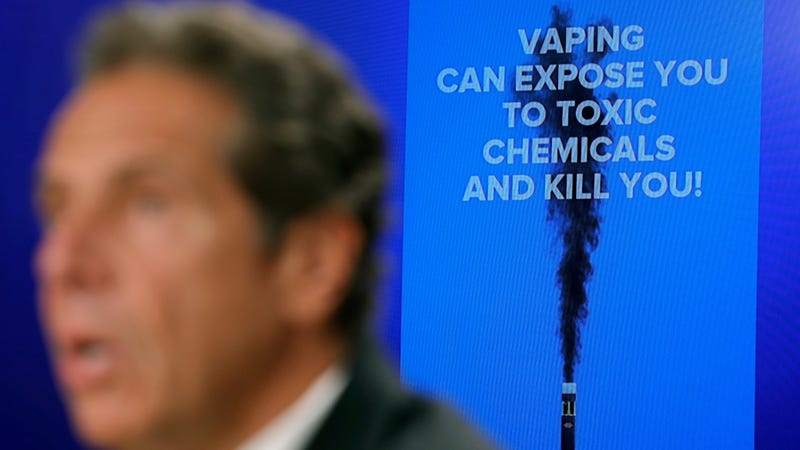
The New York state Department of Health’s Public Health and Health Planning Council approved an emergency ban of all vaping products with flavors other than tobacco or menthol—and have doubtless started a mad rush on mint, mango, creme, and countless other types of vape juice—amid skyrocketing teen use and hundreds of cases of vaping-related lung illnesses across the country.
Former Food and Drug Administration chief Scott Gottlieb, a supporter of a federal ban, has described the underage use and vaping-associated pulmonary illness (VAPI) issues as “conflated” and requiring “separate actions and separate public health concerns.” Currently, the seven deaths and 380 confirmed and probable cases that have been confirmed by the Centers for Disease Control are believed to possibly be linked to black market adulteration of THC products with potentially dangerous chemicals like Vitamin E acetate. However, CDC and state health officials told Stat News that researchers have yet to identify a definitive cause, cautioning that cases seen since April may be instances of long-term vaping damage or be tied to multiple causes.
The teen use issue is more clear-cut: The CDC recently released data showing 27.5 percent of U.S. high school students have used an e-cigarette in the last 30 days, with some 60 percent of those who vaped reporting using fruit, menthol, and mint flavors. Other recent research published in the Journal of the American Medical Association showed that vaping among adults aged 18-24 shot up 46 percent from 2017 to 2018 and that the trend is being driven by flavored vaping products. Per a USC press release:
“Sales of ‘pod-mod’ style e-cigarette products, such as JUUL, with high nicotine concentrations in fruity and minty flavors, are climbing,” said Adam Leventhal, professor of preventive medicine and psychology and director of the USC Institute for Addiction Science at the Keck School of Medicine of USC. “Young adults overwhelmingly prefer e-cigarette flavors not present in regular cigarettes.”
E-cigarette use didn’t significantly change among adults 25-44 years old and decreased in people aged 45 to 64 years and 65 years and older from 2014 to 2018.
New York City health commissioner Dr. Oxiris Barbot warned in a recent editorial that vape use is growing among middle schoolers, with about one in 15 reporting currently using e-cigarettes. It’s much worse among high schoolers: according to AM New York, New York state data shows that 27 percent of high school students (and 40 percent of twelfth graders) vaped last year, a 160 percent increase from 2014.

Barbot compared the rise of flavored Juul pods—and a surge in third party “Juul-alike” flavors after Juul pulled its fruity flavors from sale—to Big Tobacco’s aggressive marketing of menthol cigarettes in black neighborhoods. The FDA has accused Juul of marketing to underaged users and the evidence shows it’s hard to dispute otherwise.
AM New York reported that the Public Health and Health Planning Council emergency order “bans flavored e-cigarettes and vaping liquids in all forms” other than tobacco and menthol flavors. The state Health Department, its regional offices, and local authorities will seek to levy heavy fines against individuals or entities involved in retail, distribution, or manufacturing of banned flavors that defy the ban, AM New York wrote:
Any individual or entity with ownership in a retail, distribution or manufacturing company accused of selling banned flavors could face civil penalties of up to $2,000 per violation. Retail employees accused of selling prohibited flavors could also face civil penalties. Under the ban, a violation can be issued for each individual unit of flavored e-liquid that is possessed, manufactured, sold or offered.
The ban is effective immediately, but Cuomo’s office told AM New York that a two-week grace period will apply before enforcement begins on Oct. 4. Emergency orders only apply for 90 days, after which the council must decide whether to extend it, although Cuomo expects legislators to pass a permanent ban in January 2020. After extensive criticism from heavy hitters like the American Lung Association on the menthol exemption, Health Commissioner Dr. Howard Zucker is preparing a report due in two weeks on whether to revoke it, according to AM New York.
“It is undeniable that vaping companies are deliberately using flavors like bubble gum, Captain Crunch and cotton candy to get young people hooked on e-cigarettes—it’s a public health crisis and it ends today,” Cuomo told reporters. “New York is not waiting for the federal government to act, and by banning flavored e-cigarettes we are safeguarding the public health and helping prevent countless young people from forming costly, unhealthy and potentially deadly life-long habits.”
The federal government under Donald Trump is mulling a ban on all flavored products other than tobacco, taking almost the entire vape industry off guard and raising the specter that the entire industry could be decimated.
A sweeping ban in Michigan on flavored vape products that is not yet in effect extends to individuals caught with more than four such products unless they are able to show it was not intended for sale, while lawmakers in D.C. are considering proposals to ban flavors and require prescriptions for other vaping products. In California, Governor Gavin Newsom said he lacked the authority to ban flavored vaping products but announced a crackdown on counterfeits. Industry lobbyists have fought against the efforts tooth and nail, per the New York Times, as both big and small players in the business are heavily reliant on flavored products.
“I’ve had better days,” Dallas and Houston area vape chain owner Schell Hammel told the Times. “This will definitely cause every small vaping shop, including my own, to shut down.”
“There’s a large group of well-intended public health experts who regard e-cigarettes as a huge public health problem,” University of California, San Francisco health professor Dr. Steven A. Schroeder told the paper. “And I think they have been opportunistic on seizing on [VAPI] to ban all of these products without giving thought to the broader implications.”











